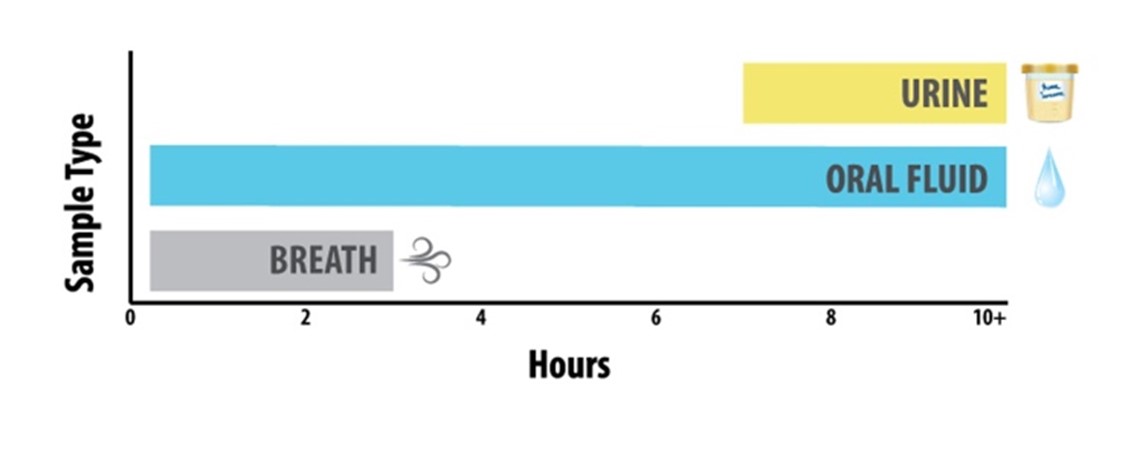By Bill Current
This information is provided for educational purposes only. Reader retains full responsibility for the use of the information contained herein.
With some form of cannabis now legal in the majority of the United States, employers are left to question if they should even continue screening for cannabis in their workplaces. This article will cover a number of questions that employers may face in today’s ever-changing workplace environment.
Is it legal to drug test for cannabis?
Employers face a complicated legal environment when it comes to legal cannabis in the workplace. Generally speaking, it is legal to drug test for cannabis in nearly all states and circumstances. Additionally, the federal government still requires testing for cannabis in federally regulated industries.
New York is the only state to generally prohibit workplace testing for cannabis, with only a few exceptions outlined in their restrictive guidance. All other states permit testing for cannabis, though some may limit the circumstances under which you can test or take action. Employers in Illinois, for example, cannot refuse to hire or discharge an individual because they use lawful products outside of the workplace and during non-call hours. Additionally, the law provides specific criteria for how/when an individual can be determined to be “under the influence.”
The bottom line? Regardless of what state or states you operate in; it is legal to test for cannabis in at least some circumstances. Make sure to review all state laws carefully, as it’s not unlikely that your state(s) require certain criteria to be met prior to acting based on a cannabis-positive test or even to perform a cannabis test.
What are the latest cannabis trends?
While drug testing has historically been based on the detection of delta 9-THC, cannabis chemists are now basing many products on delta 8-THC as it is not generally tested for in the workplace and delta 9-THC can be easily converted to delta 8. Delta 8-THC is naturally occurring and has similar psychological effects to delta 9-THC but has never been considered a cannabinoid of concern due to its occurrence in only very small quantities. Delta-8 THC is currently legal at the federal level.
Cannabis users may believe that using delta 8-THC will spare them a positive drug test; however, delta 8 will still return a positive result. Employers should be aware of this rising trend to ensure that they can speak to employees knowledgably about the risks associated with delta 8 usage, particularly when it comes to workplace safety.[1]
Why should I be concerned about individuals coming to work while under the influence if cannabis is legal?
The million-dollar question (or more accurately, the question that is the cost of your average drug and alcohol testing program) is this – why should I be concerned about employees using cannabis if its legal? The bottom line is that with cannabis becoming increasingly more accessible, more people than ever before are using it. In fact, the positivity rate for cannabis in the general U.S. workforce increased 50% from 2017 to 2021.[2]
When an employee comes to work while under the influence of cannabis (or another substance), they can cause increased workplace accidents, lower workplace productivity and employee morale, and open the employer to potential negligent hiring and respondeat superior lawsuits. As cannabis continues growing in popularity, it will likely lead to more restrictions on how and when employees can test for drugs, not just legal ones, making workplaces across the country less safe.
Even for non-safety-sensitive employees, cannabis impairment is a concern. A recent study showed that cognitive impairment from cannabis use can last between three and ten hours depending on the quantity of THC taken, how it was ingested, and the individual in question.[3] Regardless of whether an employee is in a traditional safety-sensitive position or not, coming to work while impaired (say, after ingesting cannabis in the morning prior to coming in for a shift) is a major concern. An employee may be sitting a desk, but still have access to sensitive financial or company information, or regular contact with clients – would you want such an employee to come to work while impaired and risk making a mistake with clients or sensitive information?
[1] Interested in learning more about delta 8-THC? Check out this article in our latest issue of What’s the Buzz.
[2] The Quest Diagnostics Drug Testing Index.
[3] https://cosmosmagazine.com/health/body-and-mind/how-long-does-impairment-last-after-cannabis-use/
What testing method should I use to detect cannabis and other drugs?
The issue with cannabis and traditional testing methods is that cannabis remains detectable in the system for far longer than its impairing impact lasts – sometimes for up to weeks, depending on specimen type. Choosing a testing method that has a long history of success as well as one that detects recent use rather than historic use is essential for employers that want to ensure a safe workplace, permit employees to partake in legal activities while outside of the workplace, and comply with state laws. While there are multiple test specimens that exclusively detect recent use, oral fluid is the only method that is federally endorsed, easy to collect, and covers the entire window of impairment for cannabis.

